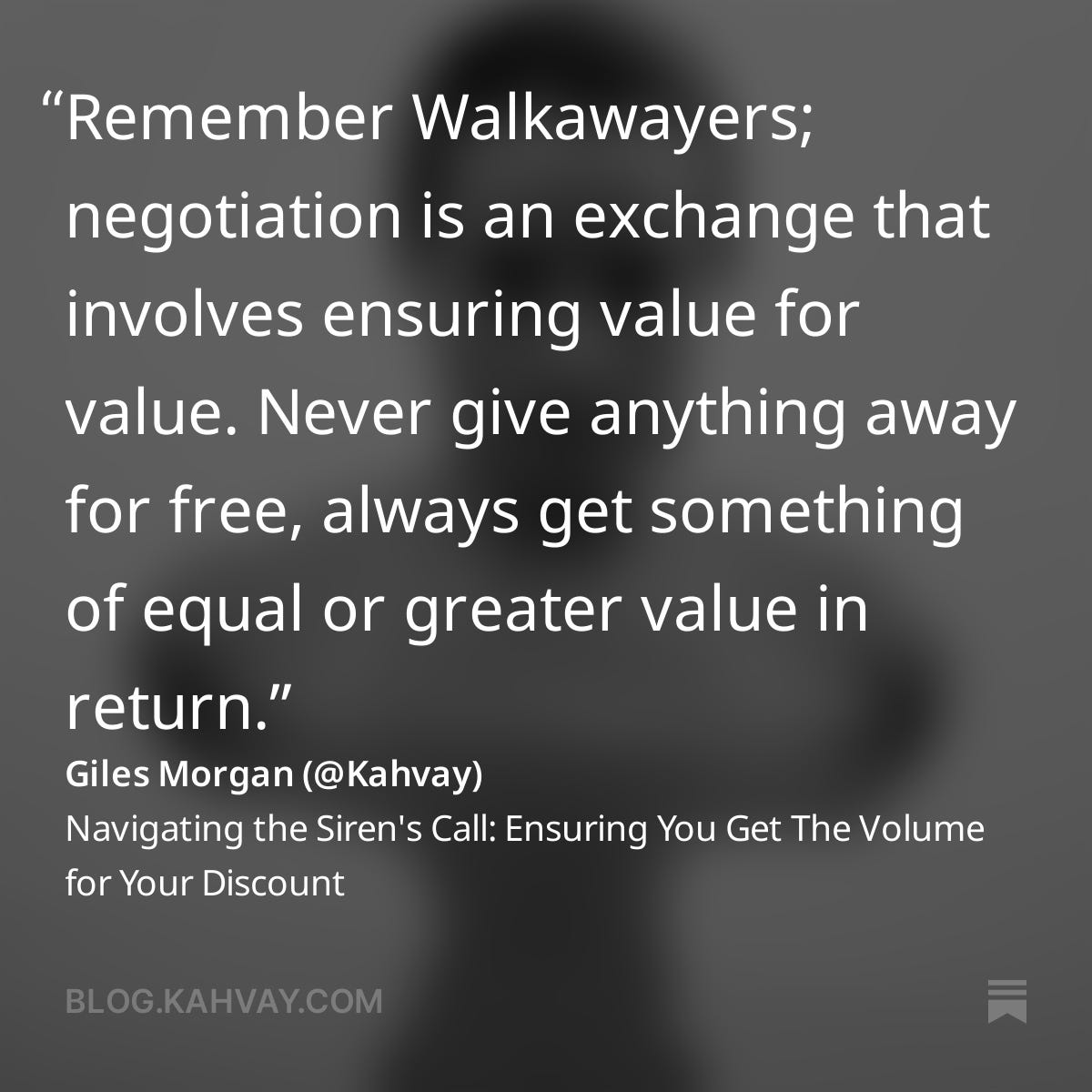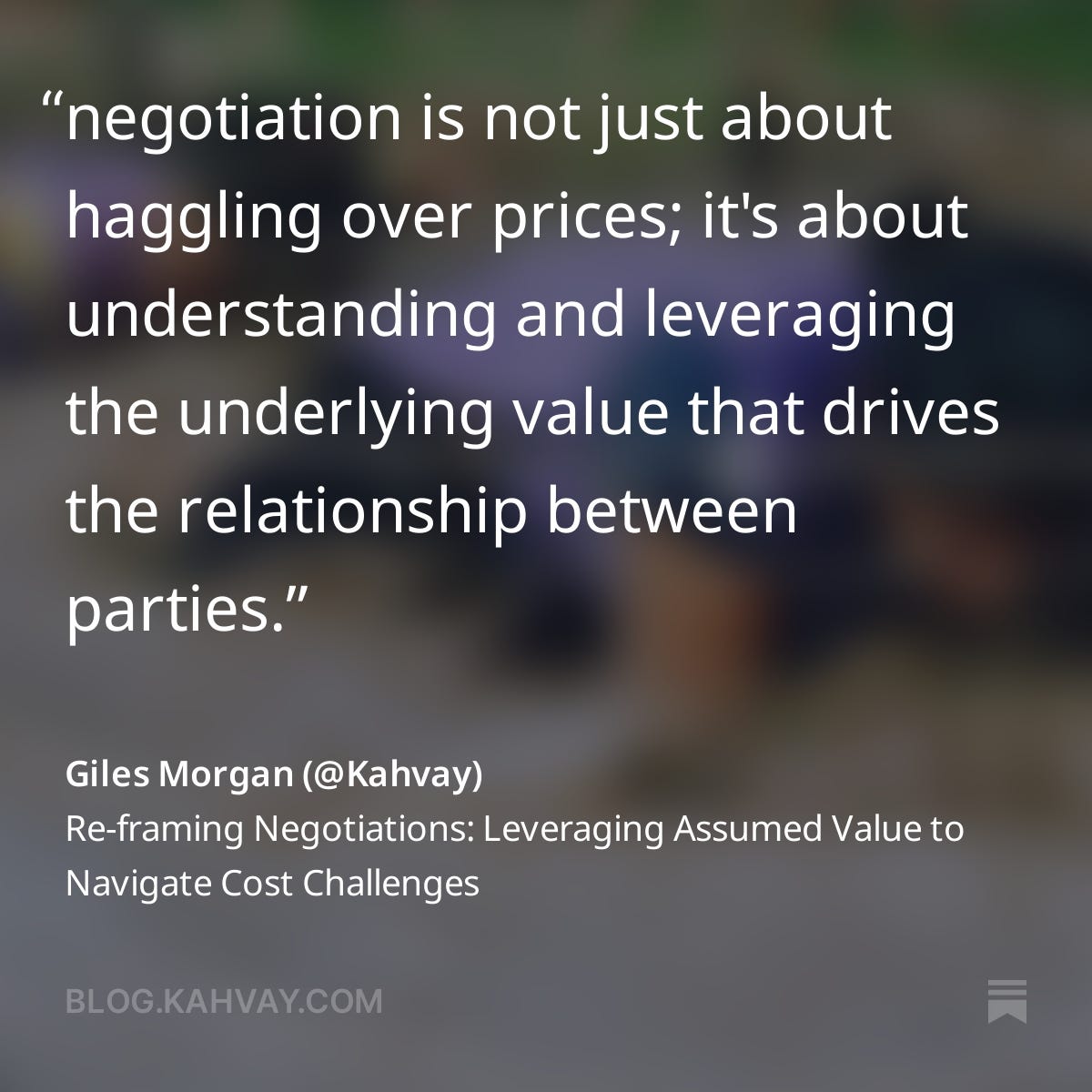Re-Negotiating Payment Terms in Recruitment: Balancing Client and Business Needs.
Mastering Payment Term Negotiations: Strategies for Recruiters to Thrive in a Challenging Market
The Weekly Walkaway highlights negotiation in its ‘good’, ‘bad’ and sometimes ‘downright ugly’ forms. Issue No. 86 (13th September 2024).
Introduction
Hello, Walkawayers!
After a long summer break and a mad panic returning to our dusty ol’ desks, The Weekly Walkaway team at Kahvay are back in the saddle…
This week we wanted to share a recent conversation we had with one of our trusted partners, at the Recruitment Employment Confederation (REC), where they highlighted a theme they are hearing repeated by many of their members, which is;
The ongoing challenge of “renegotiating payment terms” in today’s market climate.
With many of those same members never having to experience a downturn in the markets in their careers. So we thought we might dive into this hot topic to help shine a light and offer some guidance.
Note: We’ve included a fair few links to other articles if you’d like to dive deeper into each area.
Introduction: Re-Negotiating Payment Terms in Recruitment
Re-negotiating payment terms is critical for recruiters and professional services alike. They can impact cash flow, client relationships, and long-term sustainability and with the ever-shifting market dynamics and talent shortages, striking a balance between client satisfaction and fair compensation is obviously essential and often uncomfortable.
Well, it’s time, to get ‘comfortable with being uncomfortable’. The path through to the promised land is rarely if ever, the easiest…
From our experience working within the recruitment industry; the crunch points when renegotiating payment terms are the same time and time again.
And, more often than not, ‘you’ as a recruiter have a sense that you are unable to influence the outcome because you feel like you lack the power or authority to turn the tide in your favour.
But as Giles, our founder will always like to say to those he consults with on the subject of ‘POWER’:
“You are always more equal than you think”
First off, let’s dive into the typical crunch points when you renegotiate terms (comment below if you think we’ve missed any) and what can be done about them…
Negotiation Crunch Points
1. Payment Schedule: You, the supplier, often prefer short payment schedules (e.g. 15-30 days) for better cash flow, while your clients might prefer extended terms (60-90 days). How you strike a balance is crucial for both parties.
2. Upfront vs. Contingency Fees: Some recruiters request upfront payments, particularly for high-level roles, while clients often prefer contingency models. Finding a compromise ensures steady cash flow while satisfying client preferences.
3. Payment on Placement vs. Start: Clients may prefer to pay once the candidate starts the job, reducing dropout risks. Recruiters, on the other hand, prefer earlier payments to ensure revenue security.
4. Guarantee Periods: Setting guarantees, such as free replacements if a candidate leaves, can be contentious. Balancing risk for both sides is vital.
5. Late Payment Penalties: Introducing penalties for late payments ensures timely cash flow but may face resistance from your clients.
Do these sound familiar, What have we missed?
Regaining Power in Negotiations
Most if not all of the above can be solved through regaining your power in a negotiation.
We have written about how important real and perceived ‘power’ is in a negotiation in previous posts.
Not only how you ‘gain’ power, But also how you can ‘lose’ power by ‘selling’ when you should just be negotiating.
‘Selling’ is often seen as the quick fix, and one we see a lot in a transaction-only-based recruitment business. However, the fact is;
‘Selling’ vs ‘Negotiating’ and the fact that it (selling) just gives away your power. You just seem more needy than them! Simples.
Giles Morgan
When you just need to simply state your proposal, and then just ‘shut up’. Be assertive, and negotiate from a position of strength.
Tips:
Be Confident: Clearly articulate your value, and be willing to walk away from unfavourable deals if necessary.
Create Urgency: Highlight high demand for your services to encourage clients to accept favourable terms.
Offer Flexibility: Propose creative solutions like early payment discounts or instalment options to satisfy both parties.
Practise the art of reciprocity: one of our most popular articles here, talks about this.
Master the art of the conditional trade: The magic phrase of ‘If you…then we’ is your friend (if you don’t believe me try it on your kids!) the pain before the gain. For example;
“If you reduce the payment schedule to 14 days, then we will consider offering guarantee periods of 3 months”.
If you follow this simple rule 👆you will go a long way to avoiding the inevitable ‘race to the bottom’, another theme highlighted as a concern by the team at R.E.C.
Avoiding the “Race to the Bottom”
Much like inflation, the more you drop your prices the more value you give away. You must resist the pressure to reduce fees or extend payment terms beyond what’s sustainable. Here are a few tips on how:
1. Lead with Value: Focus on the quality of your placements and the long-term benefits you provide, not just price.
2. Avoid the Price Wars: Competing solely on price devalues your expertise. Instead, offer tiered services or added value without cutting fees. Failing that, know your damned walkaway folks and WALKAWAY!
3. Establish a Strong Brand: Build a brand that is ‘known’ in your niche. Changing the perception of authority and ‘power’ in your clients mind and allow you to justify the higher rate and more favourable terms. If you need any guidance here, speak to Rob Quirk at Birky Bridge, a recruitment marketing specialist in this space.
“Remember: you have the right to negotiate”
Asserting Your Rights as a Negotiator
A final point that never ceases to amaze us is that it's an easily forgotten fact that you ALL have the ‘right to negotiate’.
You have the right;
1. Walkaway: to protect your business by setting non-negotiable terms and walking away if necessary.
2. Fair Compensation: to insist on fair payment for your expertise and services.
3. Enforce Contracts: to ensure clients honour agreed terms, including payment schedules and penalties for late payments.
Summary
The challenges recruiters face when renegotiating payment terms in a fluctuating market. requires maintaining a healthy balance between client satisfaction and ensuring fair compensation.
Key negotiation crunch points include payment schedules, upfront vs. contingency fees, payment timing, guarantee periods, and late payment penalties. All of which can be addressed through understanding the power dynamics within the negotiation room.
We get it, Negotiation is uncomfortable, and it can be stressful. But, like any skill, it is a muscle that you must practice to help you navigate better-negotiated outcomes.
Remember: You have a right to negotiate.
That’s all for this week folks. We hope you find some of this useful in your day to day. And as ever if you need us just pop us a message.
Good luck out there!
Over n Out








